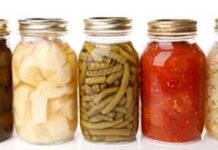by Dana Douglas, MScFN, RD, Registered Dietitian and Public Health Nutritionist
Best Buys
Knowing what the “best buys” are in the grocery store can help with budget conscious shopping. To save money when purchasing produce, look for fruit and vegetables that are in-season which are typically less expensive. Reduce waste by buying fresh fruit at various stages of ripeness. Choose some fruit that is ripe and ready to eat and some that will ripen in a few days. Frozen and canned produce is just as nutritious as fresh, and less expensive. Look for canned options that are low in sodium and sugar.
Other tips include: use best before and expiry dates, choose store brands, and plan for meatless meals. Choose foods with a best before or expiry date that will give you enough time to eat it all and prevent waste. Store brands are nutritious and often cheaper than brand name products. Consider incorporating meatless meals once or twice a week. Meatless protein options such as beans, lentils, eggs, nuts and tofu are cheaper than meat options.
It’s also helpful to check out the reduced section of the grocery store. This is where stores sell overripe produce and day old bakery items at substantial cost savings. Reduced vegetables are perfect for soups and stews. Ripe bananas are great for making muffins or banana bread. Day old bread is fine to eat and could be used for grilled cheese or French toast.
Preventing Waste is Budget Conscious
When you return home from the grocery store, store foods that need to be frozen or refrigerated right away. Perishable items like meats, eggs and dairy products need to be refrigerated within 2 hours to keep them from going bad. The following storage tips will keep produce fresh for longer:
Most vegetables, like carrots, potatoes, broccoli, cabbage and celery should be stored in a plastic bag or container in the crisper of the refrigerator.
Store leafy greens by first rinsing them, wrapping them in a paper or tea towel and refrigerating in a container or bag.
Mushrooms are best stored in a paper bag.
Most fresh fruit will last longer if kept in its original packaging in the crisper.
With the exception of leafy greens, don’t wash vegetables and fruit until it’s time to eat or cook them. It’s not necessary, and washing some items like berries and mushrooms can cause them to spoil quicker.
Fruit and vegetables that are not yet ripe can be stored at room temperature until they ripen. Once ripe, store them in the refrigerator to help them last longer.
Vegetables should be stored in a different part of the refrigerator than fruit. This will prevent them from ripening too quickly.
Keep potatoes in a cool, dark and dry place, away from onions.
For more information, visit the Health Unit’s website at www.healthunit.org, connect with us on Facebook and follow us on X @LGLHealthUnit.







